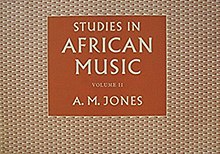Studies in African Music
 | |
| Author | A.M. Jones |
|---|---|
| Country | Great Britain |
| Language | English |
| Subject | Ethnomusicology |
| Genre | Non-fiction |
| Publisher | Oxford University Press |
Publication date | 1959 |
| Media type | |
| Pages | 295 (Volume I), 238 (Volume II) |
| ISBN | 0-19-713512-9 |
| OCLC | 6977345 |
Studies in African Music is a 1959 book in two volumes by A.M. Jones. It is an in-depth analysis of the traditional music of the Ewe tribe.
Summary[edit]
The work is divided into two volumes,[1][2] with the first volume being an analysis of the music presented in Volume II, and the second being full-score reproductions of the pieces in question.
Volume I Contents[edit]
- Introduction
- Play-Songs and Fishing Songs
- The Instruments of the Orchestra
- The Nyayito Dance
- Yeve Cult Music
- Club Dances - The Adzida Dance
- The Social Dance - Agbadza
- A Comparison of Drumming
- The Homogeneity of African Music
- Tone and Tune
- The Neo-Folk-Music
Volume II Contents[edit]
- Play-Songs and Fishing Songs
- The Nyayito Dance
- Yeve Cult Music: (a) The Husago Dance, (b) The Sovu Dance, (c) The Sogba Dance
- The Adzida Dance
- The Agbadza Dance
- The Icila Dance
Influence[edit]
Steve Reich has listed this work as an influence on his music, particularly his "fooling around with tape loops, which [he] began to envision as little mechanized Africans [laughs]."[3] It is also cited extensively in Volume I of Gunther Schuller's (who introduced Reich to the work) History of Jazz.[4]
References[edit]
- ^ Jones, A.M. Studies in African Music: Volume I. London: Oxford University Press. 1959
- ^ Jones, A.M. Studies in African Music: Volume II. London: Oxford University Press. 1959
- ^ Strickland, Edward. American Composers: Dialogues on Contemporary Music (p. 40). Bloomington: Indiana University Press. 1991.
- ^ Schuller, Gunther. Early Jazz: Its Roots and Musical Development. Oxford University Press. 1968
External links[edit]
- Studies in African Music: Volume I at The Internet Archive
- Studies in African Music: Volume II at The Internet Archive
